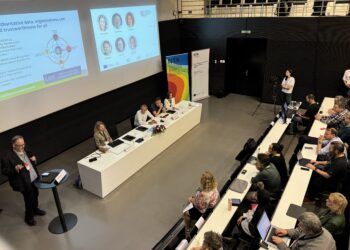
(Editor’s Note: Joe Esposito, with his colleagues Kizer Walker of the Cornell University Library and Terry Ehling of Project Muse at The Johns Hopkins University Press, has been working on an analysis of patron-driven acquisitions (PDA) for the past year. Joe has been posting early drafts of sections of the report on this research on the Kitchen. The full report is now available and can be downloaded here [PDA and the University Press 5.2 FINAL.] A summary taken from the report appears below.)
Patron-driven acquisitions (PDA) is a method by which libraries acquire books that delays purchase until the moment of first use. The aim of this report is to provide guidance to publishers, especially university presses, as to how to offset any sales losses from PDA and, through a tighter weaving of publishers’ and libraries’ interests, even identify means to augment sales and to improve the service that libraries provide for their constituencies.
While patrons have always influenced the titles collected by libraries, beginning in 1998, with NetLibrary’s entry into this market, library vendors have developed sophisticated systems to enable patrons to directly trigger purchase or rental activity. PDA deployment is becoming widespread, with about 400-600 academic libraries around the world now using such systems, a figure that is likely to increase sharply in the coming years.
Libraries generally look to PDA for three reasons: to reduce costs (by declining to purchase books that no patron has requested), to better align the library’s collection with current user requirements, and to enable libraries to present a much larger number of titles to their communities. Publishers are rightly concerned that the goal of cost reduction by libraries will reduce publishers’ sales, but may find that the second reason to implement PDA (better alignment of the library collection with the needs of the library’s patrons) is congenial, especially for mission-based, not-for-profit publishers. The third reason, the presentation of a larger catalog, is in everyone’s interest, as it serves to satisfy user needs even as it potentially opens up new opportunities for marketing additional books.
To get at the financial impact of PDA, it is necessary to come up with some good market estimates for the sale of books, especially university press books, to academic libraries. Based on a number of interviews with people active in the community now and extrapolating from data provided by the Association of American University Presses (AAUP), a reasonable estimate for library sales of university press books is about $80 million a year, about 25% of the total sales volume for university press books. PDA programs, which include titles that go far beyond the lists of university press books, have now reached about $20 million in volume each year, with approximately $13 million of that constituting the publishers’ share. University presses make up approximately 25% of PDA volume, making the market for the presses somewhere in the range of $3-$4 million. Two notes of caution here: the figures are estimates based on piecing together a great deal of informal information and are thus subject to correction, and the market is growing rapidly, making it probable that these figures will be outstripped within a year’s time.
PDA is not likely to be implemented by all libraries in a uniform or comprehensive fashion. For the most part, libraries are including PDA programs as simply one additional way they add titles to their collections. Even as PDA becomes more widespread, it is not likely that it will ever become comprehensive: all libraries may someday have PDA programs in place, but for some libraries PDA budgets will likely remain but a small part of overall spending on books. Thus publishers’ concerns that PDA could rapidly and totally transform the book market overstate the case.
What could transform the library book market and PDA as well would be a large-scale marketing effort by Amazon, whose importance to all publishers and certainly academic publishers grows every day. While hard figures on Amazon’s sales to libraries are not available, we estimate they could comprise as much as 10% of all book purchases by academic libraries, a figure that is far larger than is generally supposed. Publishers should be aware that Amazon’s penchant for disrupting markets could be brought to bear on the academic library market as well and thus transform the very structure of this segment.
Publishers reviewing their marketing plans with PDA in mind may benefit from taking a number of specific actions. For one, rather than avoiding PDA for its potential to lower sales, publishers should consider participating in all appropriate PDA services. Publishers should also put renewed interest into the development and distribution of book metadata, as such metadata can help to stimulate sales in PDA programs. Publishers may also wish to work with PDA as a means to monetize titles that formerly were uncompensated in ILL programs. Publishers may also find that PDA provides an unexpected means to offset margin erosion brought about by Amazon’s growing dominance in the book industry and publishers should look with strong interest at the digital book aggregation services, some of them quite new, as a way of augmenting their positions with libraries.
Viewed historically, PDA is perhaps best understood as one new step in a long-term process of rationalizing the book supply chain, rationalization that is abetted by the thoughtful implementation of digital technology. As such, it appears to be an inevitable development, for which publishers are likely and wisely to make accommodations.
Discussion
2 Thoughts on "PDA and the University Press — Final Study Now Available"



